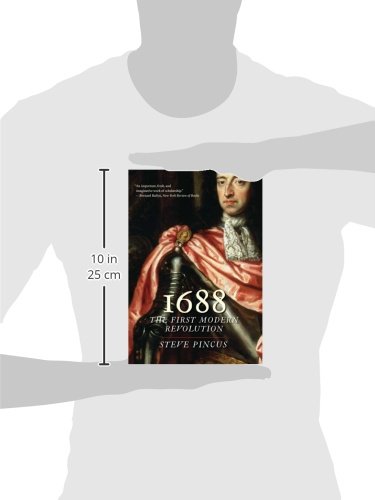


Yale University Press 1688: The First Modern Revolution
W**R
A little difficult to read, but worth the effort
At last during my holidays in Asia I found the time to read this book a few years after purchasing it. It reads like a university-thesis (no wonder that the author took 10 years to finish it), which makes it sometimes a little difficult, but the content and the details of the events which led to the Glorious Revolution 1688/89 and the Toleration Act of early 1689, which gave all British subjects religious freedom were more than worth it. Insofar the Revolution was a unique act for Europe at that time. King James II was not brought down by the lords for religious reasons (James was an aggressive Roman Catholic convert), but because he tried to introduce the absolutism of his close friend Louis XIV. of France to a population which was immensely proud of its liberties, including extensively discussing politics in the many coffee-houses. James offered religious freedom in exchange for an end to civil liberties and that's why even many British Roman Catholics and most Protestant dissenters turned against him. It was also amusing to read that King James' two daughters remained Anglicans when their father converted and one of them, Mary, was one of the driving forces to kick her father out of his country, being the wife of William of Orange, the Dutch prince, who became William III of Great Britain and Ireland following his invasion in November 1688. And no, it was not a Dutch invasion, because a huge part of William's army consisted of English expatriates. William himself was not Anglican, but Calvinist, and the United Provinces (today's Netherlands) had already a reputation of religious tolerance. His wife Mary is even quoted with the words that she doesn't see a notable difference betweens Anglicans and Presbyterians and that she is attending church service of both. Louis XIV. was ready to help James back to power, but Spain and Germany (both rigorously Roman Catholic) as well as the pope turned against him and supported William. Showing that the era of religious warfare in Europe was finally over. What a pity that there were hardly any events at the 300y-jubilee in the UK in 1988. The events of late 1688 would have been really worth it. A toast on those lords and ordinary citizens who stood up for their rights back then and succeeded.
P**S
Good. Just what I needed
This book transformed the debate about late seventeenth-century England.Good. Just what I needed. Arrived in good time and as described.
G**A
Una nueva visión, que me parece muy convincente, de un tema fundamental
Una nueva visión, que me parece muy convincente, de un tema fundamental en la historia no ya del Reino Unido o de Europa, sino del mundo, porque narra el nacimiento del sistema parlamentario, la historia de la primera revolución política nacional (es la principal tesis del libro). Buena y novedosa investigación, competente exposición, leerlo es placentero einstructivo
A**R
Good
As good as advertised
A**R
What else is wrong?
When the author, Steve Pincus, cannot even get the place that William of Orange landed in England right, he asserts many, many times that William Landed in Torbay, whereas the actual landing site (commemorated by a large plaque) was Brixham, it does make me wonder what else he got wrong in this book.
Trustpilot
4 days ago
3 weeks ago